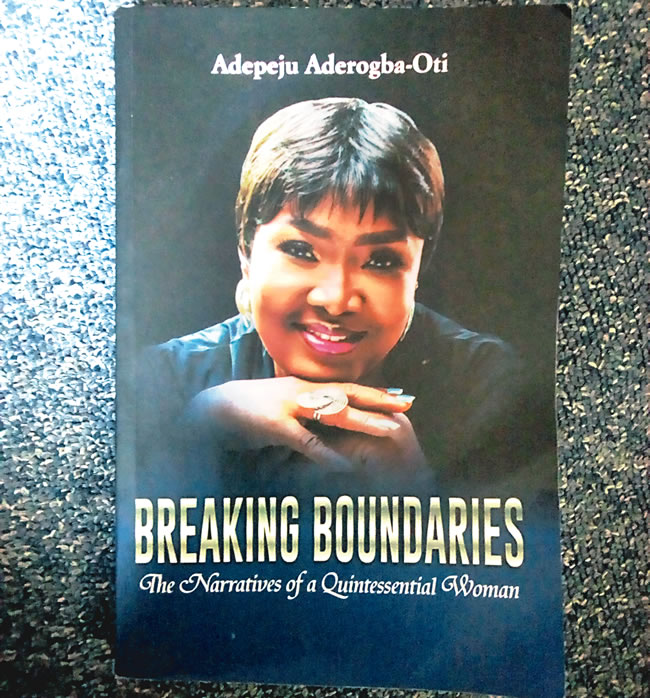A review of Dr Adepeju Aderogba Oti’s autobiography, Breaking Boundaries: The Narratives of a Quintessential Woman.
Many people actually feel autobiographies are for the aged; those who have lived their lives and are just sharing their experiences with the upcoming generation. So why is Dr Oti penning her autobiography at such a young age? She gives her reason in the Preface of the book when she writes, “some close friends also began to ask me why I would want to write an autobiography when I was basically under 50. My response was that I have something to say. I have a message to pass across — a message of hope, doggedness, resilience, courage, relentlessness, power, influence, struggle, determination and leadership.”
This response by Dr Oti summarises what the book is all about.
The 195-page book, published by Fragipani Publishing, starts with ‘Before the Beginning,’ where the author takes the reader back to family, even before her birth. She shares how her mother waited for four years to have her elder sister, and another longer wait before she finally joins the family.
The fact that the new baby, who is Dr Oti today, is also a female, makes some people to be disappointed.
In describing this situation, Dr Oti says, “it was a period of our cultural history when premium was placed on the birth of a male child. Dad probably had to brace up for many rounds of unwanted jest and painful jokes about this second female child. Such remarks must have been statements like: Ah, Iya Bolanle fi eyin e le le, meaning your wife has defeated you again.”
Dr Oti also focuses on her mother, Cleansheet Juliana Abike Ricketts, born on June 14, 1940 to the popular Ricketts family of Agbowa-Ikosi, Lagos State.
She reveals that the family migrated from Kingston Town in Jamaica and settled in Agbowa-Ikosi, a fishing and quiet community in the suburb of Lagos, where they engaged in boat and waterways transportation, animal husbandry and farming, with the business name, The Ikosi Industry Limited.
In this section, the author digs deeper into her ancestry, revealing that the first generation of the Ricketts family that landed in Nigeria was headed by Reverend Edward Ricketts and his wife, Leticia. The couple had seven children, five males and two females, with Dr Oti’s maternal grandfather being the last.
In subsequent sections, Dr Oti reveals her mother’s no-nonsense nature, especially in raising her children.
On her mother, Dr Oti says: “It was good my mum didn’t have a career in teaching; she probably would have ended up behind bars because she didn’t seem to know how to teach without the cane, slapping and beating.”
In another section, the author focuses on her father, Daniel Aderoju Aderogba, who became a prominent high chief in Ilesha due to his hard work, diligence, and contribution to the social, educational and economic development of Ilesha town, though he is a native of Ibadan.
The author delves into her father’s childhood, his background, public service years and story of Ibadan, his hometown.
She also shares with the reader her parents’ relationship, which she describes as a marriage made in heaven.
The author’s rebellious nature comes to the fore in a section of the book where she takes the reader back to when her mother is carrying her pregnancy. She says her pregnant mum comes in contact with some prophets who made pronouncements about the would-be life of the unborn child.
Among the pronouncements is that she must not cut her hair and must abstain from some classes of food.
However, because of her rebellious nature in her teenage years, she will specifically go against the ‘visions,’ with the most daring one being going to a barbing salon one hot afternoon to cut her hair.
However, the author realises that there are periods in the life of human beings, especially during the teenage years when one naturally goes against laid-down rules.
She likens her decision to cut her hair to how the biblical Samson defied the instruction of his parents by not only marrying from an enemy nation, but getting involved with other strange women in defiance of his calling as a Nazarene.
Therefore, in this section, the author stresses how important the teenage years are, especially for girls, as any wrong decision at this period will be difficult to reverse and can jeopardise a promising destiny.
This book, apart from telling the story of the author, will also serve as inspiration to the girl-child.
YOU SHOULD NOT MISS THESE HEADLINES FROM NIGERIAN TRIBUNE
We Have Not Had Water Supply In Months ― Abeokuta Residents
In spite of the huge investment in the water sector by the government and international organisations, water scarcity has grown to become a perennial nightmare for residents of Abeokuta, the Ogun State capital. This report x-rays the lives and experiences of residents in getting clean, potable and affordable water amidst the surge of COVID-19 cases in the state.
Selfies, video calls and Chinese documentaries: The things you’ll meet onboard Lagos-Ibadan train
The Lagos-Ibadan railway was inaugurated recently for a full paid operation by the Nigerian Railway Corporation after about a year of free test-run. Our reporter joined the train to and fro Lagos from Ibadan and tells his experience in this report…






